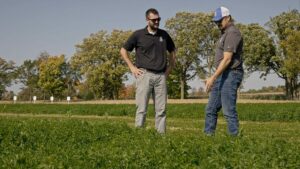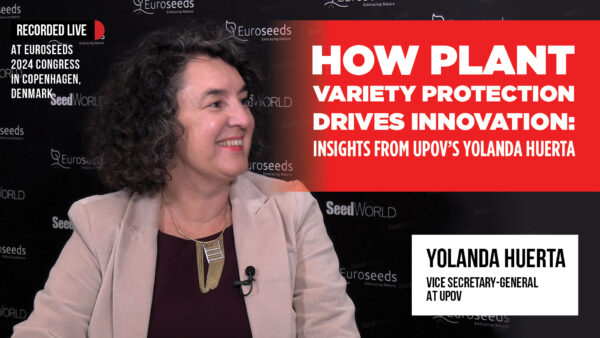Industry News is geared to seed professionals and delivers the people, industry, business and product news you need to know. Submissions are welcome. Email us at news@issuesink.com.
PEOPLE NEWS
Monsanto Company has announced that Brett Begemann has been named the company’s president and chief commercial officer. In his expanded role as president, Begemann will lead the oversight and operational execution of the company’s near-term expansion and growth in key international markets. Hugh Grant will continue to serve as the chairman and chief executive officer for Monsanto, where he maintains ongoing responsibility for leading the company’s long-term corporate strategy, as well as setting direction and maintaining oversight of its operations. Begemann formerly served as Monsanto’s executive vice president and chief commercial officer for global business operations.
Roeland Kapsenberg has joined DLF International Seeds in Oregon as vice president of forages. Kapsenberg brings more than 30 years of experience in the forage market, with expertise in the alfalfa area, to the position. He will be working to develop and strengthen DLF’s forage sales and marketing position in domestic and international markets. During the past seven years, Kapsenberg has worked with sales and marketing in the forage company Cal/West Seeds as international marketing manager and business developer.
Legacy Seeds has announced that Jim Wold has accepted the role of sales manager for the Legacy Seeds Dealer business, and will continue to serve as the company’s corn product manager. Loren Jesch will assume Wold’s district sales responsibilities as district sales manager for Northwest Wisconsin. Prior to joining Legacy, Jesch was a sales manager for a forage/cover crop firm. Nina Holte has accepted the position as agronomy services manager. Holte will help Legacy Seed dealers and customers manage the company’s seed products better through education and communication. Dave Robison has joined Legacy as forage manager. He will be focused on growing Legacy’s alfalfa and forage business with Legacy dealers and private label alfalfa customers.
The International Seed Federation has announced that Tim Johnson of Illinois Foundation Seeds Inc. has been elected president of ISF. “It’s an honor and opportunity to have a representative from the U.S. seed industry taking such an important leadership role to work on behalf of the global seed industry,” said Andy LaVigne, American Seed Trade Association president and chief executive officer. “Tim does outstanding work and I’m confident that he’ll move the global seed industry forward, while keeping all interests in mind.”
Seed product business professional and agronomist Louis Sutton has joined AgVenture Inc. of Kentland, Ind. Sutton will serve the nationwide network of independently owned and operated regional seed companies as product and technology manager. He will provide leadership and support to regional seed companies across the Plains and western Corn Belt. During his career, spanning more than 25 years, Sutton has guided and directed seed sales and agronomy programs for several leading seed companies.
Stoller Enterprises has added Marcus Jones to the research and development team. Jones’ role will be to implement and manage field research to support sales and retail operations in the U.S. Corn Belt. Jones will primarily be responsible for setting up protocols, observing research plots during the season, and managing Stoller research conducted by and at universities located in the western and central corn and soybean belt.
PRODUCT NEWS
Germains Seed Technology and Chemtura AgroSolutions, a division of Chemtura Corporation, have reached a successful collaboration agreement. Germains can now offer an exciting development in plant health for the seed industry in the form of gopure, powered by Rancona technology. Both parties have signed an exclusive agreement that will see Germains become the sole supplier of this powerful and unique technology for spinach seed applications in the United States.
Advanced Biological Marketing has added a new biological seed enhancement for increasing yields in alfalfa and clover. Graph-Ex SA for alfalfa and clover will feature crop-specific blends of the same beneficial strains of Trichoderma microbials and encapsulated rhizobia that have proven successful both in field trials and on the farm for corn, soybeans and other crops. Graph-Ex SA for alfalfa and clover will be available this fall.
Effective immediately, Syngenta has begun enhancing its cucurbit seed offerings with a standard on-seed application of FarMore Technology. All Syngenta squash, melon and open field cucumber seed sold in North America is being treated with FarMore Technology, the first comprehensive combination of separately-registered seed protection products, proprietary application technologies and dedicated seed treatment services that maximize vegetable production value by enhancing performance and quality.
BUSINESS NEWS
Bayer CropScience has completed its purchase of AgraQuest Inc., a global supplier of innovative biological pest management solutions. The acquisition of AgraQuest significantly boosts Bayer’s ability to make available to customers worldwide a comprehensive range of integrated and sustainable crop solutions based on seed, traits and combined chemical and biological crop protection, including seed treatment. Bayer plans to achieve €3 billion in its fruits and vegetables business by 2020—and AgraQuest will help add to this goal.
Canterra Seeds Ltd. of Canada and the French-based Group Limagrain have announced an exclusive licensing agreement for the commercialization of advanced wheat seed varieties for the cereal grain growers of Western Canada. The new strategic alliance will leverage the joint strengths of the two companies by helping them develop and test new and advanced wheat genetics, as well as producing and commercializing seed of those products across the Canadian provinces of Manitoba, Saskatchewan, Alberta and British Columbia. Field performance testing, selection and development of new products will begin with the 2012 crop, followed by commercial production and sales introductions after performance verification and registration.
Dow AgroSciences LLC has opened its new research and development facility in Olivia, Minn. The new site features several increased capabilities, including accommodations for soybean breeding and an expansion dedicated to corn research. A number of new positions have been added this year with plans to continue to increase employment over the next five years. The investment was a necessity to support the growth objectives of DAS’ seed and traits business, such as SmartStax and herbicide tolerance traits.
Bayer CropScience, the Commonwealth Scientific and Industrial Research Organization and the Australian Grains Research and Development Corporation have formed a partnership to increase yield in wheat. Through genetic modification, CSIRO has developed wheat that produces significantly more grain. Bayer CropScience and CSIRO aim to further develop this technology in order to bring about new solutions to farmers’ needs. The partnership builds on the discovery by CSIRO of a gene technology that enables up to a 30 percent increase of wheat yield in glasshouse trials. The GRDC and CSIRO provided initial research funding, and Bayer will now join them to support the next stage of development.
Beck’s Hybrids has announced the purchase of a 150-acre site in Henderson, Ky. Plans for the new property include building a distribution center, conducting practical farm research studies, operating the southern choice trials program, and providing farmers with educational and agronomic support. “We are excited to officially extend our heritage into Kentucky to better serve farmers in our southern
marketing area,” says Sonny Beck, president of Beck’s Hybrids. “This long-term investment will allow us to better deliver the best performing seed products to farmers in Kentucky, southern Indiana and southern Illinois.”
S&W Seed Company, a leader in the development of non-dormant alfalfa seed varieties, has closed on the previously announced purchase agreement to acquire 640 acres of high-quality farmland in Calipatria, Calif. The company also finalized a lease agreement to farm on an adjacent 1,240 acres of farmland. The total of 1,880 acres of land will be primarily utilized for the production of the company’s proprietary alfalfa seed varieties. The initial lease term will be five years, with 920 acres available for production in year one, and 1,240 total acres available in years two through five.
AgReliant Genetics is expanding its production capacity by adding a complete seed corn production facility in Iowa which will include receiving, husking, sorting, drying, shelling, bulk storage, conditioning and warehousing. When completed, the facility is expected to add 25 full-time jobs as well as a large number of seasonal part-time jobs. Completion of the facility is anticipated in the summer of 2015.
Syngenta and Agrinos have expanded their existing commercial cooperation. In April this year, Agrinos entered into an initial pre-commercial test phase with Syngenta to explore the viability of different product combinations to be marketed as new offerings by Syngenta. The trial results to date have supported a decision to expand the cooperation and initiate commercial discussions. The agreement will enable Syngenta to bring Agrinos products to market either in combination with existing Syngenta technologies or on a stand-alone basis from the first quarter of 2013. Trials will continue within Europe, the Middle East and Africa on other crops, and plans for new trials in the Asia-Pacific and Americas regions will be developed. The results from these further trials will form the basis for commercial expansions within the cooperation.
INDUSTRY NEWS
As the fastest-growing segment of the agricultural input industry, the $2.6 billion global seed treatment market continues to be recognized as a cost-effective and environmentally favorable means of increasing crop productivity, according to Kline & Company’s latest published report, Seed Treatment Global Series: Market Analysis and Opportunities. The United States remains the leading seed treatment market, claiming over 38 percent of global market share; however, China and Brazil in particular have eroded this lead over the last five years. Brazil now accounts for nearly 21 percent of global market share. Of the 10 leading crops encompassed by the report, corn accounts for over one-third of 2011 seed treatment sales, followed by wheat at just under one-fourth.
Steve Moose, an associate professor of corn functional genomics at the University of Illinois, and graduate student Wes Barber may have discovered a new source of heterosis, or hybrid vigor, in corn. Hybrid vigor refers to the increased vigor or general health, resistance to disease and other superior qualities arising from the crossbreeding of genetically different plants. They found that differences are due mainly to hybrids inheriting distinct small interfering RNAs, a subset of sRNAs, from each parent. The siRNAs interfere with gene expression. Moose and Barber also found that hybridization does not create new siRNAs, but hybrids have a more complex siRNA population than their parents because they inherit distinct siRNAs from both parents. Moose and Barber hope their work might provide more insight into the decision of which inbred corn lines to cross.
A new technique will allow plant breeders to introduce valuable crop traits even without access to the full genome sequence of that crop. The technique, published in the journal Nature Biotechnology, links important agronomic traits in crop plants with active regions of the genome. Instead of requiring knowledge of the crop’s complete genome, it identifies only expressed genes. “For many crop plants, markers are still lacking because of the complexity of some plants’ genomes and the high costs involved,” said Ian Bancroft, who led the study at the John Innes Centre. “We have succeeded in developing markers based on the sequences of expressed genes, widening the possibilities for accelerated breeding through marker-assisted selection.” The researchers are now working with Limagrain to produce reliable markers for hybrid performance in oilseed rape.











